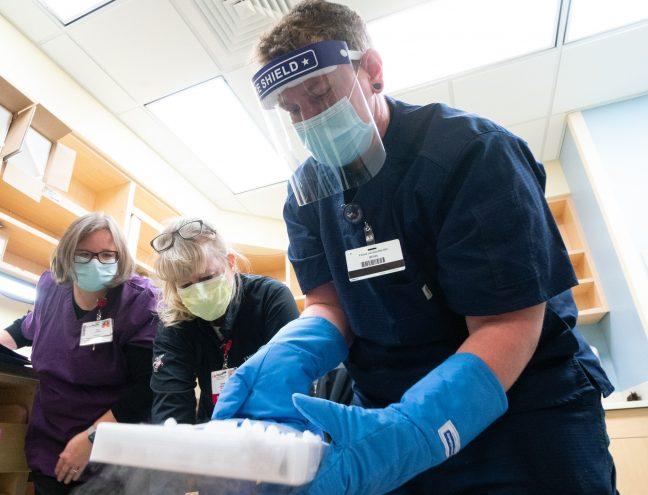Public Health Madison & Dane County and the University of Wisconsin are providing COVID-19 vaccines to individuals in Tier 1a, which includes frontline healthcare workers not affiliated with a healthcare system, hospital or long-term care facility, according to a PHMDC press release.
Jan. 5, UW started their COVID-19 vaccination program, and as of Jan. 8, 1,000 people have been vaccinated on campus, Director of Strategic Communications for University Health Services Marlena Holden said. The vaccination process will continue in the week of Jan. 11.
The Wisconsin Department of Health Services provided vaccines to UW, and 75% of those vaccines will be used on students and the remaining 25% on staff, according to Holden.
“We’re going to get through that first round [of vaccinations] for Tier 1a folks and then people will come back for their second dose,” Holden said. “And they were already being scheduled for that as soon as they were vaccinated.”
After receiving the second dose of the vaccine, it may take a week or two before the recipient reaches immunity. Those eligible to receive the vaccine are Phase 1, Tier 1a personnel, defined by Holden as those who are in direct contact with COVID-19 patients or samples in a laboratory setting. Some healthcare personnel included in Tier 1a are nursing assistants, chiropractors, dentists, hospice workers and pharmacists, according to the Wisconsin State Disaster Medical Advisory Committee.
The Tier 1a population at UW is around 2,000 people, Holden said. Students working in healthcare, including at UHS, are being vaccinated. According to Holden, researchers and students, such as those at the School of Pharmacy and those working with human subjects in clinical settings, may be eligible for immunization.
“If students or staff have been cleared to work in settings where they are exposed to COVID-19 patients or specimens, then yes, they would be eligible to receive the vaccine,” Holden said. “Those in the School of Pharmacy or clinical psychology program not working in a clinical setting would not be eligible to receive the vaccine with Tier 1a personnel.”
Phase 1b might include those aged 75 and older and non–health care frontline essential workers, and Phase 1c is anticipated to include those aged 65–74 and those aged 16–64 with high-risk medical conditions, as well as essential workers not included in Phase 1b, according to the DHS.
The timeline of vaccine distribution is not set in stone, as the federal government determines the vaccine allocations for Wisconsin weekly, according to DHS Deputy Secretary Julie Willems Van Dijk.
“The federal government allocates [the] COVID-19 vaccine to each state by total population, not by Phase 1a population. Because we have a high proportion of long term care residents and health care workers in Wisconsin compared to our population, we have a lot more people to vaccinate in phase one compared to vaccine received, so we need more vaccines to be allocated to our state,” Van Dijk said at the Jan. 11 DHS media briefing.
Van Dijk went on to announce that first responders in the police and fire departments would be eligible for vaccination starting next week, which they described as a seamless way to begin moving into Phase 1b of immunization.
While Van Dijk expressed the difficulty of determining when the vaccine would be available to the general public, they mentioned late spring to early summer as a possibility.
“It’s something we’ll know better week by week as we move along,” Van Dijk said. “You know, two weeks ago, we hadn’t done a whole lot of phase one and now we sit at a point where somewhere between 25 and 30% of our phase one participants have been vaccinated.”
Holden said the vaccine is healthy and safe, and it will be provided at no cost when it is widely available.
Even after the vaccine is available to the public, it is important that everyone continues to follow public health guidelines, like wearing a mask, washing hands and social distancing.
“We’re very fortunate in that we’re already able to vaccinate these [Tier 1a] folks, but by the time we get to the general population we could be looking at a year,” Holden said. “We hope [it will be] sooner than that, but we want to continue to practice these safe, proven and effective strategies like mask wearing, in addition to being vaccinated.”


